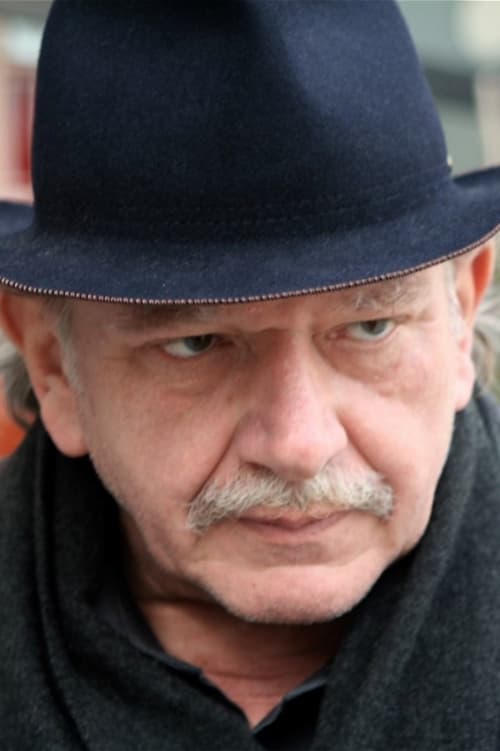Jean-Louis Comolli
Nacimiento : 1941-07-30, Philippeville - Constantine - France - [now Skikda, Algeria]
Muerte : 2022-05-19
Historia
Jean-Louis Comolli is a French filmmaker, screenwriter and writer, born in 1941 in Philippeville (now Skikda, Algeria). After working for Les Cahiers du Cinéma from 1962 to 1978, of which he was editor in chief from 1966 to 1971, he became a director of fiction and documentaries. Also a journalist for Jazz Magazine, he has co-written or edited several books on jazz. His multiple works and his theoretical thinking on cinema have nourished many filmmakers and documentary lovers. He died on May 19, 2022.

A few months before he died, Jean-Louis Comolli meets up with Dominique Cabrera for some free conversations with Isabelle Le Corff. They talk about cinema, life, love, death and Chassagne-Montrachet wine. There is laughter and smiles. One is not really serious at the age of eighty.
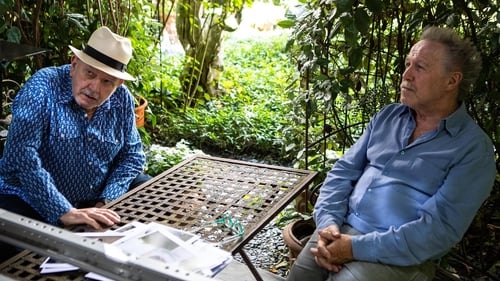
Director
This is a peaceful conversation between two filmmakers, Nicolas Philibert and Jean-Louis Comolli. A conversation, or the pleasure of spending time together. Nicolas Philibert describes with great precision his way of working and invites us to examine the ethical dimension of his process.

Director

Director
Resorting to the images that make up three quarters of the last century, Jean-Louis Comolli chose films that crossed his path fifty years ago, discovering his own history of cinema, and particularly the documentary cinema. Visual score orchestrated by a voice off (his) which lists topics that are important to him - the place of the viewer, the fiction in the documentary, the impact of technical progress on the artistic field ... -, the film weaves unpredictable wires between the excerpts .

Director
Jean-Louis Comolli and Jean Narboni, former editors at Cahiers du Cinema, interview their former colleagues and fellow travellers during the "Red Years" of the journal between 1968 and1973.

himself
Jean-Louis Comolli and Jean Narboni, former editors at Cahiers du Cinema, interview their former colleagues and fellow travellers during the "Red Years" of the journal between 1968 and1973.

Director
Complemento al DVD de las películas de Comolli.

Director
French film and WWII historian Sylvie Lindeperg analyzes Alain Resnais's seminal 1956 film, "Night and Fog", and attempts to place it in the context of the historical treatment of WWII, and specifically of the Holocaust, in the decade following those harrowing events. Oddly, she argues that the images of Resnais's famous film are "powerless", in her words.

Director

Director
In June 1999, Jean-Claude Gaudin organized a great popular festival, "La Massalia", to celebrate all the communities that make up Marseilles and to show the desire of thousands of people from elsewhere to be Marseillais. A radiant rainbow. Less than a year later, in March 2000, the municipal campaign began: what about this new state of mind that seemed to be blowing over Marseilles' political life? Does it find a translation in the political sphere? How many children of recent immigration would be in an eligible position and would eventually be elected among the 101 municipal councilors?

Director
Two daughters of North African immigrants, born in Marseilles, who are barely over thirty years old, take part in the political battles and local elections: Nadia Brya in the cantonal elections, and Samia Ghali in the municipal ones.

Director
La historia de un error judicial.

Writer
Grabado entre los meses de febrero y marzo de 1999 en la Cúpula, el espacio de ensayo de Els Joglars, este documental revela el proceso creativo de una compañía teatral a la hora de recrear la vida del mítico dirigente anarquista Buenaventura Durruti, aí como las circunstancias que rodearon su muerte. En combinación con documentos audiovisuales de la época, Els Joglars retratan la vida de un hombre que, según el periodista y escritor soviético Ilià Ehzenburg, sería imposible de narrar porque se parece demasiado a una novela de aventuras. (FILMAFFINITY)

Director
Grabado entre los meses de febrero y marzo de 1999 en la Cúpula, el espacio de ensayo de Els Joglars, este documental revela el proceso creativo de una compañía teatral a la hora de recrear la vida del mítico dirigente anarquista Buenaventura Durruti, aí como las circunstancias que rodearon su muerte. En combinación con documentos audiovisuales de la época, Els Joglars retratan la vida de un hombre que, según el periodista y escritor soviético Ilià Ehzenburg, sería imposible de narrar porque se parece demasiado a una novela de aventuras. (FILMAFFINITY)

Director
1997 legislative elections: a few days before the dissolution of the National Assembly, it appears that the central problem of this new battle is that of an evaluation of the balance of power between the governing right (RPR-UDF) and the extreme right (FN).

Director
En un castillo del siglo XVIII, siete jóvenes músicos pasan quince días pensando y preparando, bajo la dirección de Michel Portal, clarinete principal, una nueva interpretación del Concierto de Mozart. Allí vivirán juntos, escucharán y comentarán diferentes versiones de la obra, las analizarán con el clarinetista, acogerán a otros grandes solistas o directores, cuestionarán el manuscrito (inacabado) de la obra, lo discutirán con un musicólogo y, sobre todo, tocarán según las indicaciones de Michel Portal que explora la partitura.

Director
A political fable. A tragicomedy set in Marseille during the municipal elections of June 1995. In populist northern districts, they rally around the "Nord Ambition" of Bernard Tapie. In pushing for Tapie to take town hall, they count on his support for the northern districts, but difficulties and disappointments follow. Tapie ends up backing the very enemies of his followers, so what happens then? Big fish eat small ones. This is the fourth installment of the Marseille political saga which began with, "Marseille from father to son" (1989).

Director
Documentary covering the career of French composer Georges Delerue, famous for film scores for such films as Platoon, Contempt, Shoot the Piano Player, and Jules and Jim.

Director
A “Cinéma, de notre temps” series episode directed by french film critic Jean-Louis Comolli, originally aired 16 April 1993.

Director
Las escenas tienen lugar en la oficina de la Seguridad Social de Île-de-France (CRAMIF). De octubre a diciembre de 1992, filmamos los departamentos de "Invalidez" y "Accidentes de trabajo", así como la sala de correos, los mecanógrafos y los archiveros.

Director
During the campaign of the legislative elections of 1995, most of the protagonists of Marseille from father to son reflect on the notion of democracy, the future of parties, the differences between left and right.

Director
From June 1991 to March 1992, nine months of a violent and agonizing political battle, in Provence, on the occasion of the regional elections.

Writer
Ofelia is the daughter of photographer Miguel and of deceased circus artist Lea. When her father is hospitalised with a nervous breakdown, she decides to find out the reason and in doing so discovers the truth about the relationship between her parents and the true fate of her mother.

Director
El hospital Robert Debré, este inmenso barco anclado en un meandro de la circunvalación parisina, es obra de Pierre Riboulet. Este documental retoma el diario del arquitecto mientras participaba en el proyecto. Desde el primer boceto hasta el modelo, seguimos esta gestación que es también una oportunidad para el creador de meditar sobre la belleza frente a la enfermedad, el arte frente a la muerte.

Director

Director

Writer

Writer

Director

Writer
The time is the 1930s and two Soviet spies (both Frenchmen by nationality) have been helping Communist factions during the Civil War in Spain. It is the time of Stalin's iron rule in the USSR, and the two agents are suddenly called to Moscow by the KGB. Knowing that they are in trouble for no fault of their own, fear drives one of them to suicide while the other gets his lover and her child and begins a run for his life, knowing that the KGB will never let him go free.

Director
The time is the 1930s and two Soviet spies (both Frenchmen by nationality) have been helping Communist factions during the Civil War in Spain. It is the time of Stalin's iron rule in the USSR, and the two agents are suddenly called to Moscow by the KGB. Knowing that they are in trouble for no fault of their own, fear drives one of them to suicide while the other gets his lover and her child and begins a run for his life, knowing that the KGB will never let him go free.

Director
A documentary about italian comic Totò.

Writer
Historia de la Colonia Cecilia, comuna anarquista inspirada por el veterinario italiano Giovanni Rosi y establecida en el estado brasileño de Paraná en la década de 1890. (FILMAFFINITY)

Director
Historia de la Colonia Cecilia, comuna anarquista inspirada por el veterinario italiano Giovanni Rosi y establecida en el estado brasileño de Paraná en la década de 1890. (FILMAFFINITY)

Director
A “Cinéastes de notre temps” series episode directed by french film critic Jean-Louis Comolli, originally aired 5 March 1971.

Director
A “Cinéastes de notre temps” series episode directed by french film critics André S. Labarthe and Jean-Louis Comolli, originally aired 11 November 1968.

Director
The campaign of the parliamentary elections of June 1968 in Asnieres with the three main candidates: Albin Chalandon ( UDR ), Claude Denis ( PCF ) and Roger Hanin ( FGDS ).

Director
A “Cinéastes de notre temps” series episode directed by french film critic Jean-Louis Comolli, originally aired sometime in 1968.

Lui-même
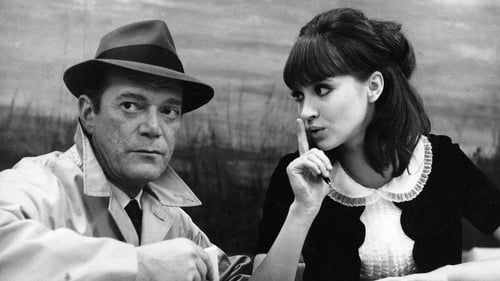
Prof. Jeckell (uncredited)
A Alphaville, una ciudad futurista situada en otro planeta, llega el periodista Ivan Johnson, siguiendo la pista del profesor Von Braun. Los otros agentes que le han precedido, Dick Tracy y Flash Gordon, han muerto. Von Braun, apodado Nosferatu, es el creador de Alpha 60, la máquina que comanda la vida mental de los habitantes de la ciudad.
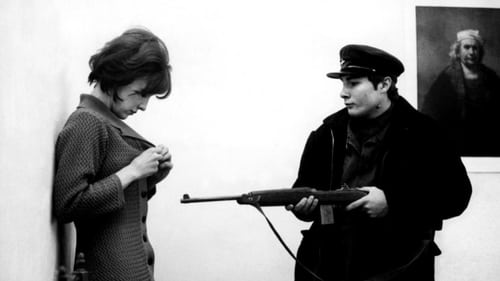
Soldier with Fish
Parábola antimilitarista donde dos campesinos reciben con júbilo la noticia de su movilización, felices y contentos de los desmanes que podrán cometer bajo el uniforme. (FILMAFFINITY)
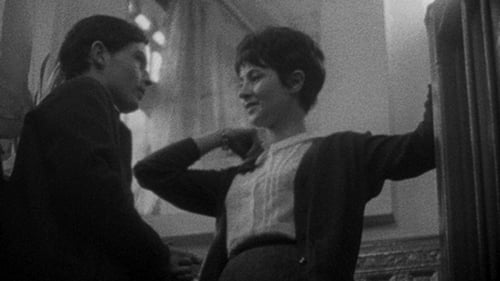
Party Guest (uncredited)
Bertrand y Guillaume, dos universitarios que mantienen una ambigua amistad, entablan relación con Suzanne, una joven empleada que representa para Bertrand el prototipo de la chica fácil y superficial. Cuando Guillaume consigue seducirla, en Bertrand, enamorado platónicamente de Sophie, surge un sentimiento contradictorio que oscila entre la atracción y el rechazo hacia Suzanne. Ese sentimiento oculta el temor a no ser aceptado en el caso de que intentase abordarla, ya que su orgullo no podría tolerar ese rechazo. Segundo cuento "moral" de Rohmer.
